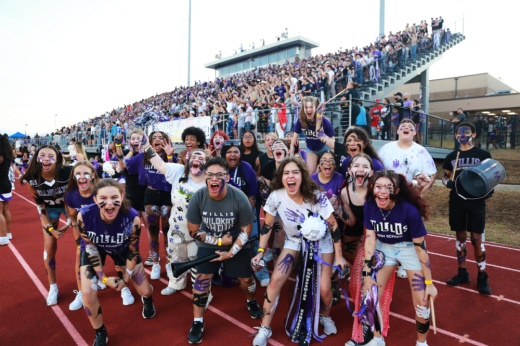Willis ISD’s stadium, built in 1974, was made to accommodate a high school of 300 students, Director of Communications Jamie Fails said.
In the 50 years since then, the high school’s capacity has grown to around 2,700 students, and WISD turns away around 200-300 people each football game because of capacity issues.
“We’re already paying thousands of dollars a year to add extra bleachers to the end zones in order to let the visitor band and our band and our dance team sit in the stands,” Fails said.
Capacity and accessibility concerns are why WISD is putting propositions for a new stadium and a pool on the May 4 ballot, part of a $218.1 million bond package that includes propositions for a ninth-grade expansion and a student activity center.
Two-minute impact
In the May 4 election, voters in WISD’s jurisdiction will have the opportunity to vote for or against four bond propositions totaling $218.1 million. This latest bond election follows a $100.15 million bond in 2020 and a $143 million bond in 2022.
“The next phase of growth that we need to address is the high school,” Fails said.
This upcoming bond election is also the second time voters will weigh in on propositions for a stadium and natatorium. In the 2022 bond election, propositions for the stadium and natatorium did not pass by 77 and 12 votes, respectively. In 2020, these two propositions were taken off the bond package due to the economic climate at the time, according to the district’s website.
“The reality is the growth is coming,” Fails said. “We can’t stop it, and as an educational facility, it is our job to be prepared and to provide the best education and academic facilities we can.”
After a community bond presentation held March 19, Juan Cristales, who has three children in WISD, said he didn’t know how he was going to vote on the 2024 propositions.
“I’ve heard opposing opinions,” Cristales said. “And I need to figure out which way we’re going to go with this thing.”What they’re saying
- “There’s some concerns. We have a lot of high growth. ... But then also going into debt so much is pretty extreme.” —Juan Cristales, WISD parent
- “We just want the public to remember that every time we delay doing these things, they cost more in the long run, and they also hurt our capability to expand for our students that are coming anyway. ” —Jamie Fails, WISD director of communications
Diving in deeper
With the 2020 and 2022 bond packages, there was no increase to the tax rate because of the district’s growth and the increase in property taxes, Fails said. With the 2024 bond, the district expects there will be a tax rate increase.
“With the amount of bond debt that we have right now, it’s just not going to be the same situation,” Fails said. “When you’re passing bonds in a short amount of time like that, it’s not as easy to do the no-tax-increase thing.”
If all four 2024 bond propositions pass, the tax rate would increase by $0.079 per $100 of valuation. That figure will decrease if not all the propositions pass, Fails said.
Also of note
The district cannot fund infrastructure projects with its annual budget, as 85% of it is used for salaries, with the rest going toward things such as curriculum, maintenance and utilities, Fails said.
“There’s not a significant amount of money that would ever be available at one time in order to build actual facilities that run in the millions based on construction needs,” Fails said. “All school districts have bond debt if they’re growing. All school districts have needs for facilities and buildings. It’s just how it happens in Texas. There’s not a way for us to absorb that cost in-house.”
Districts are also facing budget concerns following the 88th legislative session in 2023, during which essentially no action on school funding took place. Bob Popinski, the senior director of policy for Raise Your Hand Texas, a nonprofit education advocacy group, said he expects a majority of school districts in Texas to face shortfall budgets in fiscal year 2024-25.
“What you’re going to see is probably a big bulk of school districts out there having to do two things,” Popinski said. “They’re going to have to cut back programs to save money. And then just to keep the rest of the school district afloat, they’re going to have to dip into their fund balance and adopt what’s called a [shortfall] budget.”
Fails said that at this point, district officials do not think WISD will face a shortfall budget amid a focus on providing staff raises.
“[Raises] is what our finance department and our school board is focusing heavily on,” Fails said.
During the April 10 meeting, the WISD board of trustees approved a 3% raise for all staff and raised the salary for new teachers to $56,000. Fails also called the lack of action by the state regarding funding “very unfortunate.”
“When you’re talking about the amount of inflation and the amount of increase in just the world that we live in that has happened, and for [the Legislature] to have not increased any of our student funding, it’s pretty abysmal,” Fails said.
Stay tuned
If all bond propositions pass, the district anticipates the following timeline, according to its 2024 bond presentation:
2024
- Summer/fall: Design begins on all bond projects except the aquatic center
2025
- Spring: design begins on aquatic center
- Summer/fall: Construction begins on all bond projects
2026
- Spring: Transportation center opens
- Fall: Student activity center opens
2027
- Spring: Athletic complex and stadium, aquatic center opens
- Fall: Ninth-grade expansion opens





